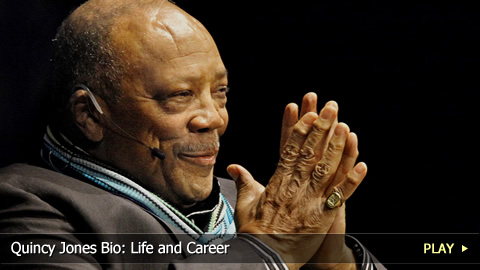Quincy Jones Bio: Life and Career of the Producer and Composer

- Trumpet and Early Musical Education
- Touring and Arranging Songs
- Jazz Band and First Album
- The Jones Boys and Mercury Records
- Song Arranging and "Soul Bossa Nossa"
- Film Scoring
- Jazz Success
- Michael Jackson's "Off the Wall"
- Thriller" and "Bad
- We Are the World
- Awards, Honors and Recognition
- Other Interests and Pursuits
- Legacy
Trumpet and Early Musical Education
Quincy Delightt Jones, Jr. was born March 14th, 1933 in Chicago, Illinois. While attending elementary school, he began playing the trumpet. His family then moved to Bremerton, Washington where he attended high school and gained further musical instruction from arranger and producer Robert Blackwell.
Touring and Arranging Songs
During the 1950s, Jones quit studying music at college to play trumpet on popular bandleader Lionel Hampton’s tour. He then moved to New York City where he became a freelance song arranger for his friend Ray Charles and acts like Dinah Washington, Count Basie and Duke Ellington.
Jazz Band and First Album
Following a tour as trumpeter and musical director of The Dizzy Gillespie Band in the mid-‘50s, Jones became the frontman of his own jazz band and began recording music for ABC-Paramount Records. In 1956, he released the first of his over 30 albums: This Is How I Feel About Jazz.
The Jones Boys and Mercury Records
The next year, Jones moved to Paris to study music and soon became the music director of French record distributor Barclay Disques. During the next years, he toured North America and Europe as part of The Jones Boys. Despite well-reviewed performances, the 18-piece big band failed to make ends meet and broke up. Mercury Records founder Irving Green helped Jones bounce back by hiring him as musical director for the label’s New York division. Within a few years, Jones advanced to vice president, and became one of the first African-Americans to hold a senior management job at such a predominantly white business.
Song Arranging and “Soul Bossa Nossa”
The 1960s saw Jones arrange songs for some of music’s biggest stars, namely Frank Sinatra and Ella Fitzgerald. In 1962, Jones released his tenth album, Big Band Bossa Nova. It featured the popular tune “Soul Bossa Nova,” which has since appeared in numerous multimedia formats, like the “Austin Powers” spy comedy series and in rapper Ludacris’ song “Number One Spot.”
Film Scoring
Jones also began focusing his attention on film scoring. His first major project was 1964’s “The Pawnbroker.” The movie’s success allowed him to leave Mercury Records and move to Los Angeles, where he composed the music for the drama “The Slender Thread.” Jones added more credits to his name over the next years, including “Walk, Don’t Run,” “In the Heat of the Night,” “In Cold Blood,” and “The Italian Job.” Notable later scores included the 1978 musical “The Wiz” starring Michael Jackson and the 1985 Steven Spielberg-directed period drama “The Color Purple.”
Jazz Success
Despite health problems, Jones released six albums that hit number one on the Jazz charts throughout the 1970s: Smackwater Jack, You’ve Got It Bad Girl, Body Heat, Mellow Madness, I Heard That!! and Sounds…and Stuff Like That!!
Michael Jackson’s “Off the Wall”
One of Jones’ crowning achievements was his three-album collaboration with pop icon Michael Jackson, and their first joint venture happened at the end of that decade: 1979’s Off The Wall sold over 20 million copies and cemented Jones’ reputation as the most powerful producer in music.
“Thriller” and “Bad”
Next up was 1982’s history-making Thriller, which sold an astounding 110 million copies and remains the best-selling album of all-time. Their final collaboration was 1987’s Bad, which sold over 30 million copies internationally.
“We Are the World”
With famine ravaging Ethiopia during the mid-1980s, Jones helped put together the charity single “We Are the World.” Performed by a group of artists dubbed USA for Africa, the song’s roster included a who’s who of the music industry. The platinum-certified sold single won several Grammys in 1986.
Awards, Honors and Recognition
Over the years, Jones has been recognized frequently for his contributions to music, arts, and education. He has won over twenty Grammys out of his seventy-plus nominations, was the first African-American to be nominated for an Oscar for Best Original Song and Score, and holds multiple honorary degrees and doctorates.
Other Interests and Pursuits
In addition to music, Jones became a passionate social activist with his own entertainment company, and released an autobiography.
Legacy
Pioneer, innovator, record breaker and humanitarian are just a few words to describe Quincy Jones, who shows no signs of stopping in his later years. With so much creative fuel driving him forward, Jones’ musical ingenuity seems limitless.
